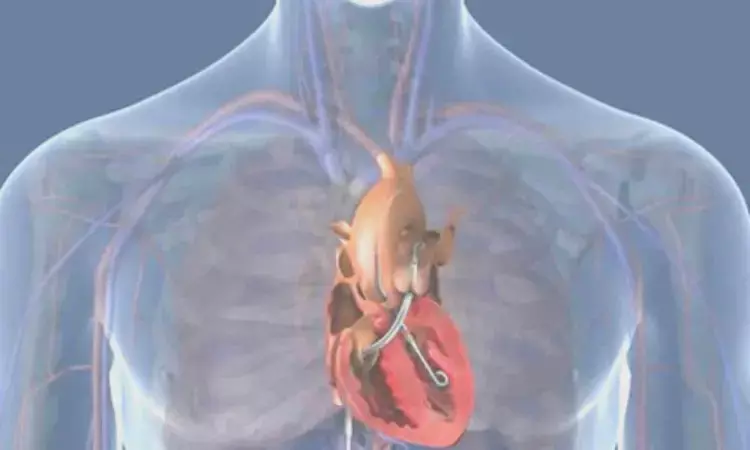- Home
- Medical news & Guidelines
- Anesthesiology
- Cardiology and CTVS
- Critical Care
- Dentistry
- Dermatology
- Diabetes and Endocrinology
- ENT
- Gastroenterology
- Medicine
- Nephrology
- Neurology
- Obstretics-Gynaecology
- Oncology
- Ophthalmology
- Orthopaedics
- Pediatrics-Neonatology
- Psychiatry
- Pulmonology
- Radiology
- Surgery
- Urology
- Laboratory Medicine
- Diet
- Nursing
- Paramedical
- Physiotherapy
- Health news
- Fact Check
- Bone Health Fact Check
- Brain Health Fact Check
- Cancer Related Fact Check
- Child Care Fact Check
- Dental and oral health fact check
- Diabetes and metabolic health fact check
- Diet and Nutrition Fact Check
- Eye and ENT Care Fact Check
- Fitness fact check
- Gut health fact check
- Heart health fact check
- Kidney health fact check
- Medical education fact check
- Men's health fact check
- Respiratory fact check
- Skin and hair care fact check
- Vaccine and Immunization fact check
- Women's health fact check
- AYUSH
- State News
- Andaman and Nicobar Islands
- Andhra Pradesh
- Arunachal Pradesh
- Assam
- Bihar
- Chandigarh
- Chattisgarh
- Dadra and Nagar Haveli
- Daman and Diu
- Delhi
- Goa
- Gujarat
- Haryana
- Himachal Pradesh
- Jammu & Kashmir
- Jharkhand
- Karnataka
- Kerala
- Ladakh
- Lakshadweep
- Madhya Pradesh
- Maharashtra
- Manipur
- Meghalaya
- Mizoram
- Nagaland
- Odisha
- Puducherry
- Punjab
- Rajasthan
- Sikkim
- Tamil Nadu
- Telangana
- Tripura
- Uttar Pradesh
- Uttrakhand
- West Bengal
- Medical Education
- Industry
Patients Supported with Impella 5.5 Percutaneous LVAD may have higher hemolysis and need for blood products: Study

Recent study evaluated hemolysis in patients supported with the Impella 5.5 percutaneous left ventricular assist device in a single-center experience. The research aimed to characterize the hemolytic sequelae in the largest series of Impella 5.5-supported patients to date. A total of 123 patients with recorded plasma free hemoglobin (PfHb) levels were included in the retrospective analysis, with 26 patients classified as high hemolysis (HH) and 25 as low hemolysis (LH) based on PfHb levels. The study found that HH patients had higher admission SCAI stages, longer Impella 5.5 support days, more additional mechanical circulatory support (MCS), and required more blood product transfusions compared to LH patients.
Risk Factors and Prognosis
Logistic regression identified additional MCS and more Impella days as risk factors for hemolysis. Survival analysis showed no significant differences in postoperative complications between HH and LH patients. However, HH patients who survived had fewer platelet transfusions and fewer days of elevated PfHb compared to those who died. The study highlighted the poor prognosis associated with hemolysis in this high-risk cohort. Further analysis of factors associated with survival in the HH group revealed that survivors required fewer platelet transfusions, had lower bilirubin levels, and fewer days of elevated PfHb. The study emphasized the importance of identifying and minimizing hemolysis, given its association with adverse outcomes.
Study Limitations
Limitations of the study included its retrospective nature, a relatively small sample size, and the lack of a consistent hemolysis definition in MCS. The authors recommended larger studies with standardized hemolysis sampling protocols to better understand percutaneous LVAD-associated hemolysis.
Conclusion and Future Research
Overall, the research shed light on the hemolytic complications in Impella 5.5-supported patients and underscored the need for aggressive monitoring and management of hemolysis to improve outcomes in this patient population. Further research is warranted to elucidate the factors contributing to hemolysis and its implications in patients receiving mechanical circulatory support.
Key Points
- The study assessed hemolysis in patients supported with the Impella 5.5 percutaneous left ventricular assist device, focusing on characterizing hemolytic sequelae in a large series of patients.
- 123 patients with recorded plasma free hemoglobin (PfHb) levels were analyzed, with 26 classified as high hemolysis (HH) and 25 as low hemolysis (LH) based on PfHb levels.
- Patients with high hemolysis had higher admission SCAI stages, longer Impella 5.5 support days, more additional mechanical circulatory support (MCS), and required more blood product transfusions compared to low hemolysis patients.
- Logistic regression identified additional MCS and longer Impella days as risk factors for hemolysis, with survival analysis showing no significant differences in postoperative complications between high and low hemolysis patients.
- Survivors in the high hemolysis group required fewer platelet transfusions, had lower bilirubin levels, and fewer days of elevated PfHb, emphasizing the importance of identifying and minimizing hemolysis for better outcomes.
- Study limitations included its retrospective nature, small sample size, and inconsistent hemolysis definition in MCS, recommending larger studies with standardized hemolysis sampling protocols for better understanding of percutaneous LVAD-associated hemolysis.
Reference –
Clothier, J.S., Kobsa, S., Lester, L. et al. Evaluation of hemolysis in patients supported with Impella 5.5: a single center experience. J Cardiothorac Surg 20, 143 (2025). https://doi.org/10.1186/s13019-025-03352-7
MBBS, MD (Anaesthesiology), FNB (Cardiac Anaesthesiology)
Dr Monish Raut is a practicing Cardiac Anesthesiologist. He completed his MBBS at Government Medical College, Nagpur, and pursued his MD in Anesthesiology at BJ Medical College, Pune. Further specializing in Cardiac Anesthesiology, Dr Raut earned his FNB in Cardiac Anesthesiology from Sir Ganga Ram Hospital, Delhi.
Dr Kamal Kant Kohli-MBBS, DTCD- a chest specialist with more than 30 years of practice and a flair for writing clinical articles, Dr Kamal Kant Kohli joined Medical Dialogues as a Chief Editor of Medical News. Besides writing articles, as an editor, he proofreads and verifies all the medical content published on Medical Dialogues including those coming from journals, studies,medical conferences,guidelines etc. Email: drkohli@medicaldialogues.in. Contact no. 011-43720751


